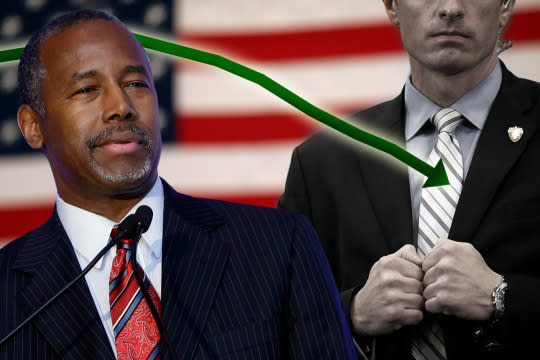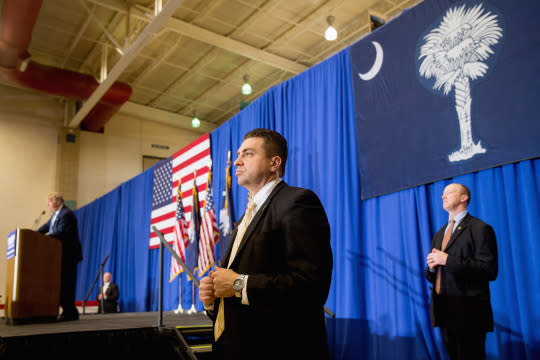Ben Carson won’t lose his Secret Service protection (for now)
How a presidential candidate gets Secret Service bodyguards is a complicated but relatively clear process.
The aspiring commander in chief requests protection from the Homeland Security secretary, who makes the decision in consultation with a special committee made up of top congressional leaders of both parties. There are guidelines. Some of them are financial: The candidate must have received at least $10 million in contributions. Some of them are political: The candidate must be competing in at least 10 state primaries. And the candidate must “have some degree of prominence as shown by opinion polls.” (That prominence is set at 5 percent.)
That last criterion raises a question: Could a failing candidate lose his Secret Service protection if he drops to negligible levels in the polls? Could Ben Carson — whose slumping campaign I recently heard mocked as “the best-defended book tour in America” — be forced to say goodbye to the besuited men and women with earpieces and guns who have surround him for months?

Illustration: Yahoo News; Sources: Getty Images, AP
The short answer, according to two people intimately familiar with the process, is no.
Currently, Democratic contender Bernie Sanders and Republican hopefuls Ben Carson and Donald Trump have protective details by virtue of their candidacies. Hillary Clinton has had Secret Service agents at her side since she was first lady and qualifies for lifetime protection. Marco Rubio, Ted Cruz and John Kasich do not have Secret Service details.

Members of the Secret Service stand nearby as Donald Trump speaks at a rally this month at the Riverview Park Activity Center in North Augusta, S.C. (Photo: Andrew Harnik/AP)
Carson, who once led GOP frontrunner Donald Trump, has performed poorly in the first contests of the 2016 race and has just four delegates to the real estate mogul’s 82. But he’ll keep his Secret Service detail as long as he’s running.
“I can’t foresee us going up to a candidate and being like, ‘Hey, we notice your poll numbers aren’t very good. We’re going to drop you next week. That’s just not something we would do,” a Secret Service official told Yahoo News on condition of anonymity.
Former House Speaker Newt Gingrich set the precedent in 2012 when he kept his long-shot White House bid going until May — well beyond the point where anyone thought he had a chance.
“We stuck with him the whole time,” the official said.
In essence, the also-rans can shed their protection in three ways: They can officially decline it, as Ron Paul did in 2012, when he said it amounted to welfare.
They can drop out of the race.
Or they can lose.
Ultimately, there can be only one nominee of each party. After the conventions, the candidates who fail to take the top spot lose their Secret Service guards, according to another official.
The same fate awaits the candidate who loses in November.
Agents typically waste little time after the voters have weighed in. In 2012, Mitt Romney lost his “Javelin” Secret Service code name just a few hours after his concession speech.
